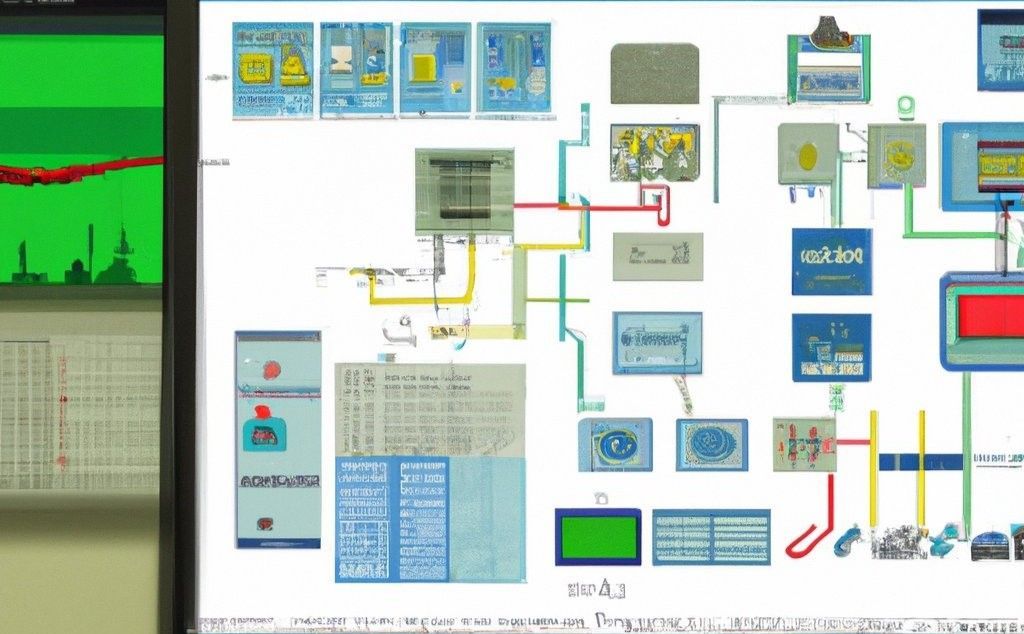HMI SCADA (Human Machine Interface) is a state-of-the-art SCADA system that enables operators to access and manipulate the system through specialized graphical user interfaces. It provides enhanced visibility, improved control and monitoring capabilities, and can also be used to automate processes in a seamless manner. With this advanced level of control over the system, users are able to maximize operational efficiency and reduce operational costs. By utilizing this technology, businesses are able to quickly visualize important data and make decisions based on real-time information that is constantly being updated. This helps them to stay ahead of the competition and make sound decisions with the latest data available. Human-Machine Interface (HMI) Supervisory Control and Data Acquisition (SCADA) systems are becoming increasingly popular due to their ability to monitor and control machines or processes in real-time with minimal effort. These systems are designed to collect data from the various connected machines or processes, analyze it and make necessary adjustments on the fly so that operations remain safe, efficient, and productive. This feature gives operators the ability to quickly respond and address any potential issues that may arise, allowing operations to be smoother and more efficient. Human-Machine Interface (HMI) SCADA systems are extensively deployed in many industrial processes, including oil & gas, energy, water treatment, and manufacturing. These systems are incredibly powerful tools that enable users to monitor and control a wide range of operations from a single user interface. The ability to quickly access real-time data from the field allows for increased visibility and improved safety protocols for these industries. Examples of AI writing assistants being used in operations, such as large refineries and power plants, are becoming increasingly common in the industrial sector. They have the potential to greatly improve output efficiency and accuracy while reducing costs, which makes them a beneficial addition for any organization looking to optimize their workflow.
SCADA System Examples
HMI SCADA (Supervisory Control and Data Acquisition) systems are computer-based systems that play a crucial role in monitoring and controlling industrial processes. They are widely employed across industries, including manufacturing and energy production, to provide real-time insights into operations.
SCADA systems offer operators up-to-date data on various processes, empowering them to make quick and informed decisions. One of the significant advantages of SCADA systems is their ability to enable remote monitoring and control of processes from anywhere globally, ensuring continuous connectivity to operations even when physically distant. Technological advancements and automation have greatly enhanced the capabilities of SCADA systems, leading to their increased popularity in diverse applications such as predictive maintenance, energy management, asset tracking, and industrial process monitoring. SCADA systems can even facilitate remote control of machinery. Moreover, they contribute to data network security by offering real-time monitoring and alerts. In the modern industrial landscape, SCADA systems are indispensable for ensuring smooth and efficient operations.
HMI SCADA systems have revolutionized industrial processes by providing real-time monitoring and control capabilities. These advanced computer-based systems have become essential in various industries, serving as a bridge between operators and the industrial environment. With SCADA systems, operators can access real-time data on the status of processes, enabling them to identify issues, make informed decisions, and optimize operations for efficiency. The ability to remotely monitor and control processes from anywhere in the world is a significant advantage of SCADA systems. This feature allows operators to stay connected and respond promptly to changes or emergencies, improving productivity and reducing downtime. The integration of SCADA systems with advanced technologies, such as predictive maintenance and energy management, enhances overall operational performance. Furthermore, SCADA systems contribute to data network security by providing real-time monitoring and alerts, safeguarding critical information from unauthorized access. As industries continue to evolve and embrace automation, SCADA systems will continue to play a crucial role in optimizing processes, increasing productivity, and ensuring operational reliability.

Artificial Intelligence powered writing assistants are quickly gaining traction and being implemented in multiple industries, such as manufacturing, energy, water treatment, and transportation. These AI writers have the potential to revolutionize the way content is created in these sectors by streamlining processes and providing accurate information in a timely manner. The potential applications of AI writing assistants are vast and far-reaching, with the capability to revolutionize the way businesses operate by enabling efficient and accurate content production in a fraction of the time. This level of automated productivity has massive implications for business operations in terms of cost savings, increased efficiency, and improved customer satisfaction. Supervisory Control and Data Acquisition (SCADA) systems are powerful tools that have become essential for the observation and management of the activity of machines, equipment, or entire production plants. This advanced technology enables users to remotely monitor and control intricate processes, while also providing real-time data analysis capabilities to ensure efficient operations. This cutting-edge technology can make existing processes run smoother, faster, and more efficiently with less effort and cost. It can also help to eliminate manual errors and reduce risks associated with the process.
Windows, Linux, .NET HMI, Web HMI, Real-Time and Historical Trending, Alarm Notifications and Logging, Log Data to an open Database.




